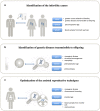The evolving role of genetic tests in reproductive medicine
- PMID: 31412890
- PMCID: PMC6694655
- DOI: 10.1186/s12967-019-2019-8
The evolving role of genetic tests in reproductive medicine
Abstract
Infertility is considered a major public health issue, and approximately 1 out of 6 people worldwide suffer from infertility during their reproductive lifespans. Thanks to technological advances, genetic tests are becoming increasingly relevant in reproductive medicine. More genetic tests are required to identify the cause of male and/or female infertility, identify carriers of inherited diseases and plan antenatal testing. Furthermore, genetic tests provide direction toward the most appropriate assisted reproductive techniques. Nevertheless, the use of molecular analysis in this field is still fragmented and cumbersome. The aim of this review is to highlight the conditions in which a genetic evaluation (counselling and testing) plays a role in improving the reproductive outcomes of infertile couples. We conducted a review of the literature, and starting from the observation of specific signs and symptoms, we describe the available molecular tests. To conceive a child, both partners' reproductive systems need to function in a precisely choreographed manner. Hence to treat infertility, it is key to assess both partners. Our results highlight the increasing importance of molecular testing in reproductive medicine.
Keywords: Assisted reproductive technology; Female infertility; Genetic tests; Male infertility; Reproductive medicine.
Conflict of interest statement
The authors declare that they have no competing interests.
Figures


References
-
- Key Statistics from the National Survey of Family Growth. https://www.cdc.gov/nchs/fastats/infertility.htm. Accessed 15 July 2019.
-
- World Health Organization . WHO Laboratory Manual for the examination and processing of human semen. Geneva: World Health Organization; 2010.
Publication types
MeSH terms
LinkOut - more resources
Full Text Sources
Medical

